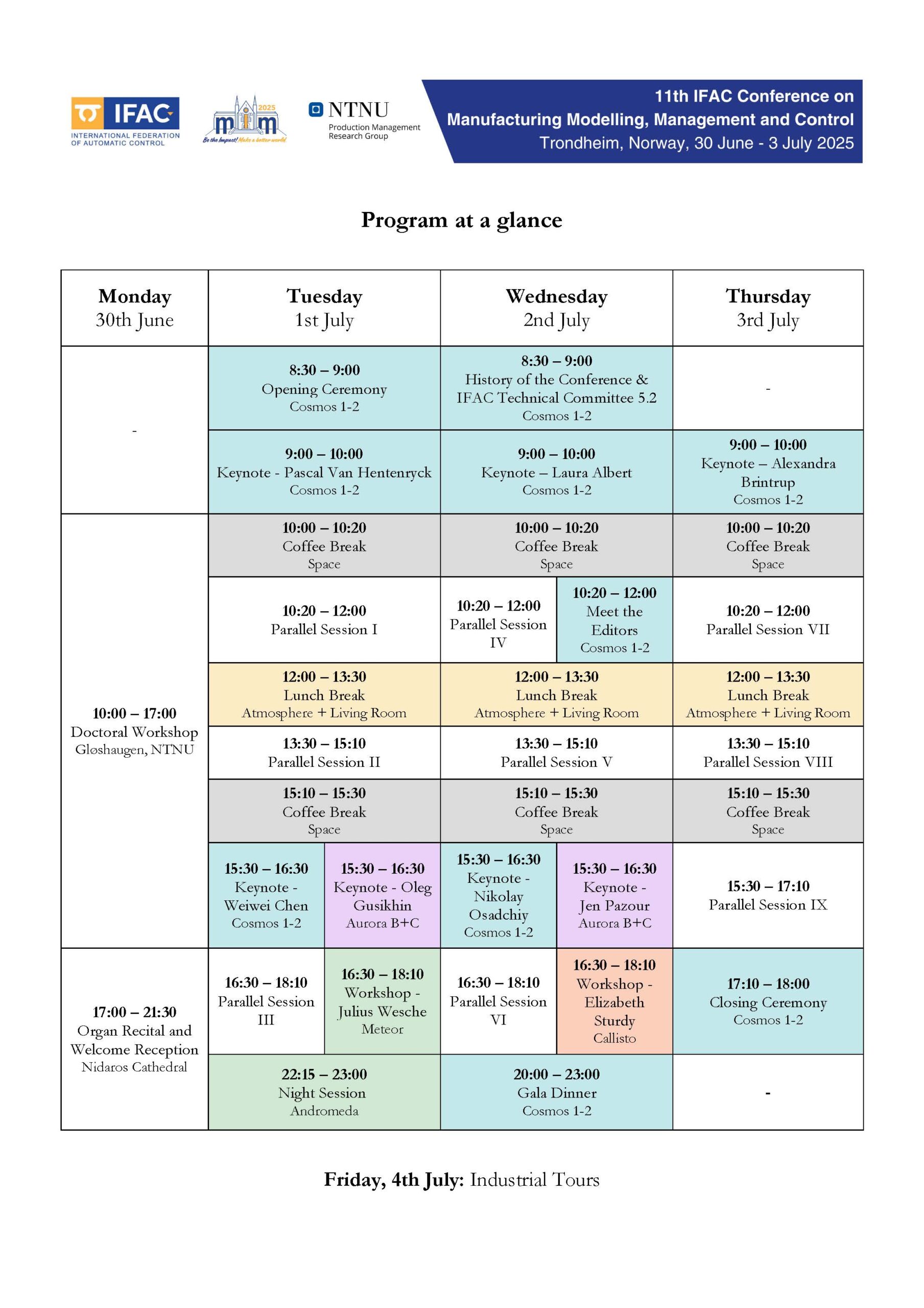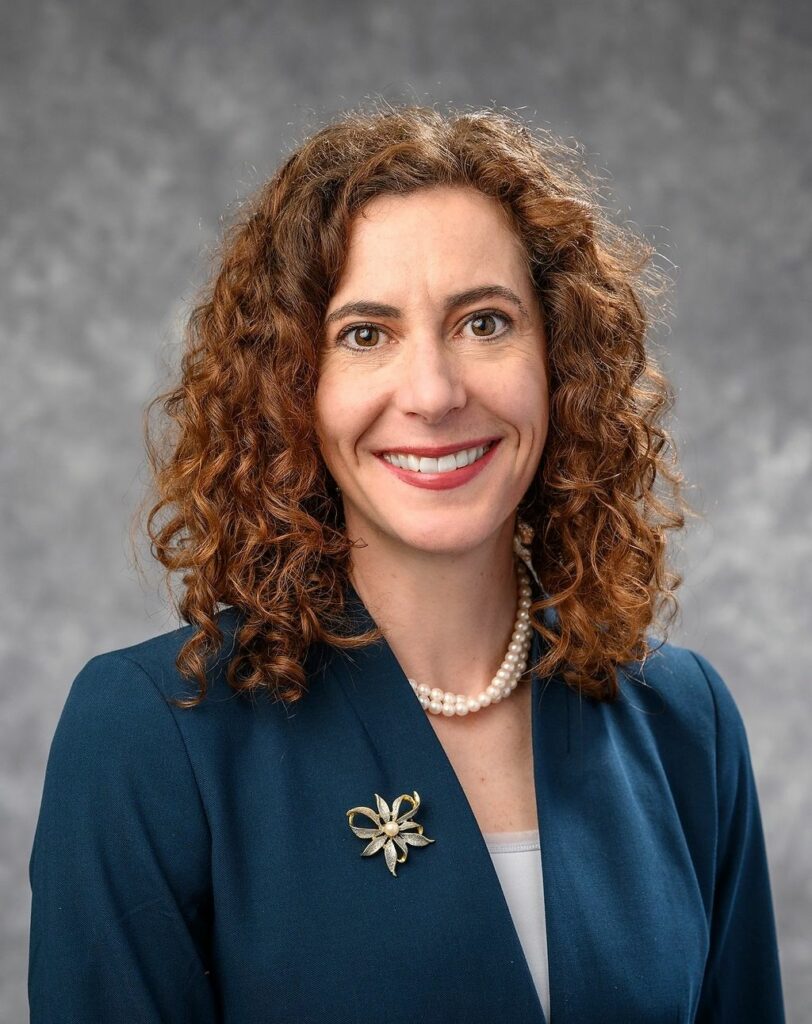PROGRAM
Program Overview

The Full Program for IFAC MIM 2025 is now online. Click here to see it!
Keynotes

Pascal Van Hentenryck
A. Russell Chandler III Chair Professor at H. Milton Stewart School of Industrial and Systems Engineering – Georgia Tech
Bio: Pascal Van Hentenryck is the A. Russell Chandler III Chair and Professor at Georgia Tech., the director of the NSF Artificial Intelligence Institute for Advances in Optimization (AI4OPT), and the director of Tech-AI, the AI hub at Georgia Tech. Van Hentenryck’s research focuses on artificial intelligence for engineering and science and, in particular, energy, supply chains and manufacturing, transportation, and health care. Earlier in his career, Van Hentenryck designed and implemented several widely used optimization systems, including the constraint programming language CHIP (the foundation of modern constraint-programming systems) and the modeling language OPL (now an IBM product). He is a fellow of AAAI and INFORMS, and the recipient of two honorary degrees and numerous teaching and best-paper awards.
AI For Engineering and Societal Impact
Short Abstract: The fusion of AI with optimization and control has the potential to deliver outcomes that are beyond the realm of these technologies when applied independently on complex engineering applications. This talk reviews the theoretical foundations underlying this fusion, including the concepts of primal and dual optimization proxies, predict then optimize, self-supervised learning, and deep multi-stage policies.
The presentation also highlights these methodological developments in a variety of engineering areas, with a focus on supply chains and manufacturing.

Laura Albert
Professor of Industrial and Systems Engineering at University of Wisconsin-Madison
Bio: Dr. Laura Albert is a Professor of Industrial & Systems Engineering at the University of Wisconsin-Madison and a recognized thought leader in operations research and analytics. Her research focuses on mitigating risks in the public sector through optimization and operations research methodologies, with applications in critical infrastructure protection, public safety, and emergency response. Dr. Albert served as the 2023 President of the Institute for Operations Research and the Management Sciences (INFORMS). She is a Fellow of both the American Association for the Advancement of Science (AAAS) and the Institute of Industrial and Systems Engineers (IISE). Her work has been recognized with numerous accolades, including the INFORMS Impact Prize, a National Science Foundation CAREER award, and a Fulbright Award. An advocate for public engagement, Dr. Albert has penned several op-eds for national news outlets and authors the engineering blogs “Punk Rock Operations Research” and “Badger Bracketology.”
Industrial Engineering with Impact: Shaping a Better Future
Short Abstract: Industrial engineering plays a pivotal role in solving some of our most complex challenges and boosting the global economy. In this keynote, we will embark on a journey to explore the boundless possibilities of industrial engineering, manufacturing, and logistics as well as the latest trends shaping the future of the field. Advancing industrial engineering and operations research through societally relevant applications has been a central theme of Dr. Laura Albert’s academic research career. In this talk, she will overview her research that studies how to design and operate public sector systems in applications ranging from public safety, critical infrastructure protection, and election resilience. Using stories from her research, she will offer insight into identifying problems worthy of study, overcoming modeling challenges, creating data-driven modeling frameworks, and influencing policy. Attendees will gain insights into how academic research in engineering can translate into tangible benefits for society and make a positive impact on our world.

Nikolay Osadchiy
Associate Professor of Information Systems and Operations Management at Emory University Goizueta Business School
Bio: Nikolay Osadchiy is an Associate Professor of Information Systems & Operations Management at Emory University’s Goizueta Business School. His research interests are in supply chain management, where he studies productivity, risk, and resiliency in supply networks, and in revenue management where he studies the impact of behavioral regularities on pricing. He has published in the leading academic journals including Management Science, Operations Research, Manufacturing and Service Operations Management, and Production and Operations Management. He serves as a Senior Editor at Production and Operations Management. Nikolay’s practice-focused work has been published in Harvard Business Review and MIT Sloan Management Review. He regularly contributes to the media commenting on the current issues and developments in supply chains.
Making More Resilient Manufacturing Networks
Short Abstract: We show how the network perspective can be used to understand and mitigate risks faced by manufacturers and their partners. We will discuss three key research areas: the propagation of idiosyncratic shocks and the bullwhip effect in supply networks, correlated shocks and systematic risks in networks, and the role of community structure in shock propagation. We will discuss implications for supplier and customer diversification strategies and the financial performance of firms.

Alexandra Brintrup
Professor of Digital Manufacturing and Head of Supply Chain AI Lab at University of Cambridge
Bio: Prof. Alexandra Brintrup is Professor of Digital Manufacturing and head of the Supply Chain AI Lab at the University of Cambridge. She is a fellow of Alan Turing Institute. Prof. Brintrup focusses on the intersection of Supply Networks, Complex Systems and Artificial Intelligence. She was the first researcher to empirically study large-scale supply chains as complex adaptive networks, examine their emergent properties, and take a data-driven perspective to characterise their resilience, which led to understanding of universal patterns that govern them. She was also the first to develop algorithms to predict supply chain dependencies and disruptions. She is a member of the UK’s All Party Parliamentary Groups in Artificial Intelligence, and advises policy development in supply chain risk, economic performance and resilience. Her current research includes: predictive methods for automated detection of supply chain dependencies, collective learning paradigms, complex system approaches to model supply network dynamics, autonomous and scalable optimisation and distributed decision making, particularly with multi-agent Systems.
Beyond mere efficiency: Artificial Intelligence for better Supply Chains
Short abstract: Artificial Intelligence (AI) and its impact on Supply Chains (SC) has become a popular topic prone to hype, hope and fear. Will AI help us “make supply chains better” or will we just use it to do what we have always been doing – just more efficiently? In this talk we will delve into “unorthodox” supply chain AI research, including digital supply chain surveillance, collective model building, and agent-based automation. We will discuss how AI, if developed and adopted in the right way, has the potential to help prevent a range of endemic supply chain issues, from modern slavery to emergence of bullwhip effects. We will conceptualise SC-AI through the lens of a human-mimicking Intelligent Agent to discuss how practitioners could collaborate with AI agents – and what risk factors should researchers pay attention to in the coming years.

Weiwei Chen
Professor in Department of Supply Chain Management at Rutgers University
Bio: Weiwei Chen is a Professor in the Department of Supply Chain Management at Rutgers University. His research interests include supply chain optimization, service operations, as well as simulation and global optimization methodologies. He earned his B.S. and M.S. degrees from Tsinghua University and Ph.D. from the University of Wisconsin-Madison. He then worked as a Lead Scientist at GE Global Research Center in New York before joining Rutgers in 2014. He is an Associate Editor for INFORMS Journal on Applied Analytics, Service Science, IEEE Transactions on Automation Science and Engineering, and a Guest Editor for IISE Transactions, International Journal of Production Research, among other editorial roles. He was Chair of the INFORMS Service Science Section from 2020 to 2023.
Shaping Better Service Systems through Data-Driven Optimization
Short Abstract: Over the past few decades, the global economy has experienced rapid growth in the service sector, which now plays a crucial role across diverse industries such as retail, healthcare, and manufacturing. Unlike traditional optimization problems that rely on predefined information and fixed parameters—whether deterministic or based on well-defined distributions—optimizing service systems in real-world scenarios often involves ill-defined parameters, requires robust predictive models, and is influenced by endogenous factors and the optimization outcomes themselves. In this talk, we will delve into these complexities in optimizing the design and operations of various service systems, including e-commerce platforms, recommender systems, and bike-sharing systems. We will demonstrate how harnessing vast amounts of data and employing advanced analytical methods can significantly improve the design and operational efficiency of service systems.

Jen Pazour
Professor of Industrial and Systems Engineering at Rensselaer Polytechnic Institute
Bio: Jen Pazour, a Professor of Industrial and Systems Engineering at Rensselaer Polytechnic Institute (RPI), develops and uses mathematical models to guide decision making for logistics and supply chain challenges. Jen is the recipient of a numerous awards, including a NSF CAREER Award, Johnson & Johnson Women in STEM2D Scholars Award, Rensselaer Alumni Teaching Award, IISE Logistics and Supply Chain Teaching Award, and IISE Dr. Hamed K. Eldin Outstanding Early Career IE in Academia Award. She is an Associate Editor of IISE Transactions, OMEGA, and Transportation Science and is the current president of INFORMS Transportations Science and Logistics (TSL). More information can be found http://jenpazour.wordpress.com/
Resource Exchange Platforms: from warehouses to non-profits
Short Abstract: Underutilized resources exist all around us. When at a stoplight, notice the empty seats and cargo spaces in the vehicles around you. Think about the monolithic distribution centers that are a mismatch for most businesses’ seasonal and fluctuating space and throughput requirements. To harness these and other underutilized resources, organizations need to think differently about how resources are acquired, managed, and allocated to fulfill requests. We will provide an overview of research into the design of resource exchange platforms to harness underutilized resources. By accessing resources with lower marginal costs, supplemental resources can be deployed when and where they are needed. Promising use cases include on-demand warehousing platforms, and SWAP, a platform that enables resource sharing among nonprofits.

Oleg Gusikhin
Senior Director, Supply Chain Analytics at Ford Global Data Insight & Analytics
Bio: Oleg Gusikhin is a Senior Director, Supply Chain Analytics at Ford Global Data Insight & Analytics. Dr. Gusikhin is a Fellow of IEEE and a Fellow of INFORMS. For over 20 years, he has been working at Ford Motor Company in different functional areas. During his tenure at Ford, he has created numerous high-impact long-lasting applications for Ford manufacturing, supply chain and connected vehicles, and holds over 100 patents. He is a recipient of three Henry Ford Technology Awards in the Manufacturing, Research, and Product Development categories and the 2014 INFORMS Daniel H. Wagner Prize for Excellence in the Practice of Advanced Analytics and Operations Research. In addition, Dr. Gusikhin is a Lecturer at the University of Michigan Industrial & Operations Engineering and engineering faculty advisor at the Tauber Institute for Global Operations.
Impacting Supply Chain Excellence through Digital Innovation and Analytics
Short Abstract: In recent years global supply chains faced unprecedented challenges. In addressing these challenges, the criticality of digitalization and data-driven approaches came to the forefront of the attention of supply chain theory and practice. The presentation overviews Ford’s supply chain digital transformation journey from individual data-driven decision support to supply chain digital twin. The presentation highlights the need for the integration of data, models, and AI/ML technology to provide end-to-end supply chain visibility and optimization, sourcing decision support, and supply chain stress test along the product lifecycle.

Stein Vanebo
Bio: Stein Vanebo began his career in 1986 by organizing small club concerts. As a member of the Trondheim Live Forum, he participated in arranging the Europe concert at Leangen Ice Skating Arena in 1986 and the A-ha concert at the same venue in 1987. Born in 1964, Stein grew up in Svalbard and Svolvær-Lofoten. Although he did not complete his undergraduate degree in psychology, he entered the music industry, starting as a commercial music radio host and working in record stores. He was one of the three founders of Norske Gram, Norway’s largest independent record company in the 1990s. What began as a hobby—organizing concerts—eventually became his full-time occupation after his children had left home. He is currently co-owner and promoter/media contact for Trondheim Stage.
From Bruce Springsteen to Robbie Williams to Metallica to Guns N’ Roses: The Granasen Concert Saga
Short Abstract: It all started in 2016. Live Nation decided, let’s go! So, in 2016, Granåsen in Trondheim, Norway, hosted its first major concert featuring Bruce Springsteen. This event marked the beginning of Granåsen’s transformation into a premier event venue, attracting world-renowned artists like Guns N’ Roses in July 2025. The journey from Springsteen to Guns N’ Roses is filled with fascinating stories and behind-the-scenes anecdotes that you won’t find in the newspapers. Organizing large-scale concerts at Granåsen involves meticulous planning and coordination, from managing shuttle buses to accommodating the crew’s unique needs. Hosting Guns N’ Roses in 2025 is akin to organizing a massive event, with over 2,000 personnel involved. This session will delve into the logistics, challenges, and memorable moments that have shaped Granåsen’s concert legacy, offering insights that go beyond the headlines.
Workshops
MIM 2025 will host a number of interactive workshops during the conference.
Those workshops will range from publishing/reviewing, funding opportunities, science communication, data analytics, to mental fitness. See below for a detailed list:
- 2nd Doctoral Workshop on Advances in Manufacturing and Logistics management and control problem, by IFAC TC5.1 and IFAC TC5.2
- Meet the editors: how to be a great researcher, by several editors participating to IFAC MIM2025
- Meet the publishers, by several top publishers who will be present with their booths and desks
- Share your science. Be the impact, by Julius Wesche, NTNU
- Data Challenge. How to impact with data, by Supply Chain AI Lab, University of Cambridge
- Be YOUR Impact! Making a better researcher through mental fitness! by Elizabeth Sturdy, Sturdy Coaching
- More to be announced…
For the doctoral workshop you check it’s own page here: PhD workshop

Julius Wesche
Researcher on Sustainability and Energy Transitions at NTNU
Share your science. Be the impact.
Short Abstract: This 60-minute session, featuring a 30-minute keynote followed by a 30-minute interactive workshop, will highlight the importance of social media in science communication and career development. The keynote will address the key reasons why researchers should embrace social media: first, to make their research more accessible and impactful by connecting with industry professionals who can apply their findings; and second, to start building a professional network outside of academia. This network can be invaluable for those considering a transition to industry, opening up opportunities and connections that might otherwise be difficult to establish. In the workshop portion, participants will engage in a step-by-step process to create their own science communication strategy. By the end of the session, attendees will have a personalized plan to effectively share their research on social media and start building a network that supports their long-term career aspirations, whether in academia or industry.

Elizabeth Sturdy
Career and Workplace Wellbeing Coach at Sturdy Coaching
Be YOUR Impact! Making a better researcher through mental fitness!
Short Abstract: Ready to be the proactive leader of your life and stress? Join coach Elizabeth Sturdy to get the tools you need to understand and interrupt stuck and negative thought patterns in yourself and others, as well as practical tools to deal proactively with stress and build resilience as a researcher.
Night Session: Sunset of the Human-Only Era: A New Dawn for Human-AI Industry
Tuesday, 22:30- 23:15 – Room Andromeda
An evening dialogue on the evolution of roles, intelligence, and trust in the future of Human-AI co-driven manufacturing and logistics.
In the frame of two EU projects, NTNU-Production Management Research Team is currently working on, X-Hulog4.0 https://x-hulog4.eu/ and SkillAIbility https://skillaibility.eu/, we are organizing a night session on a very relevant topic for our research community and the whole society: Human and AI!
This session will be a 45-minute open and highly interactive discussion.
There will be no formal distinction between panelists and audience; instead, moderators will facilitate a dynamic exchange among all participants.
Everyone’s contribution will be vital to the success of the conversation and to fostering a stimulating, forward-thinking dialogue. The session aims to encourage critical and visionary idea-sharing.
Moderators will guide the discussion by posing thought-provoking questions and steering the conversation toward identifying future needs and opportunities for our research community.
The session will be followed by a “Greetings the sunset” at the Rooftop bar.
Sunset will be at 23.32 that day.
Instructions for speakers
Presentation and equipment: In each room, HDMI connection to the projector will be available, so you will use your laptop. Please ensure that you are in the session room at the latest 15 minutes before starting your session to check the connection. Members of organizing team will support session chairs in case of need.
Duration and Schedule of presentation: Each presentation will be 15 minutes long, followed by a 5-minute Q&A session. More details and the schedule are provided in the technical program.
Format: We recommend preparing your slides in Microsoft PowerPoint (aspect ratio 16:9). Even if there is no template recommended, we strongly suggest including the IFAC MIM2025 logo on the front page of the presentation.
Session Chairing: A chair and co-chair (participating session organizers) are responsible to chair a session and manage the time for presentations and Q&A. Chair and co-chairs are assigned in the program. Please check the program and inform yourselves about your session.
Social Program
During the conference you will have the option to participate in optional tours on 1st of July! Be aware that there are limited seats for each tour based on available capacity.
Guided Walking Tour – Historical Trondheim

This walking tour weaves through Trondheim’s most picturesque and historic corners, offering a taste of the city’s vibrant atmosphere and coastal charm. You’ll experience the contrast between modern city life and centuries-old traditions, from lively gathering spots to hidden gems tucked along the river. You will see a mix of royal elegance, colourful streets, Viking history, and one truly quirky invention that’s unlike anything else in the world. Meet at the cruise terminal pier for the start of this 2-hours city walk with a guide.
Deadline to register: Monday, 30th of June – Click here to book. Price: 390 NOK
Duration: From 18:30 to 20:30
Hike with Kvikk Lunsj and Orange – Min group 20 – max 60
This is a great hike to get the body moving, enjoy the beauty and silence of nature. A bus will pick you up from the hotel at 18:15 and take you to Bymarka, a scenic hiking area in Trondheim. From there, you will walk up to Geitfjellet, a mountain top offering stunning views of the fjord and surrounding landscape. After enjoying the scenery, you will hike down toward a barn, where a snack will be served. A bus will then take you back to the hotel at approximately 22:00.
Hike level: Suitable for all. Please wear light hiking shoes and rainproof clothing.
Snacks: Two provided during and at the end of the hike.
Schedule:
18:40 Bus arrives at Tømmerdalen. Start of hike to Geitfjellet (suitable for all).
19:10 Break at the summit with a snack. Time to take photos and enjoy the view.
20:00 Return hike to Lavollen. Cinnamon bun in the barn and mingling.
21:30 Bus departs from Lavollen back to the hotel.

Deadline to register: Thursday, 26th of June – Click here to book. Price: 830 NOK (with transport).
Duration: From 18:30 to 20:30
Kajakk tour – Classic Trondheim Trip with Instructor
Discover the enchanting beauty of this historic city from a unique perspective as you paddle down its pristine river Nid.
Paddling in Trondheim is more than an activity – it’s an escape, an exploration, and a chance to connect with nature and culture. Glide by colorful old warehouses, the medieval Nidaros Cathedral, and the formidable Kristiansten Fortress, immersing yourself in the rich history and picturesque landscapes.
We also explore the river´s channel near the harbour and see sights hidden from the usual hiker. Trondheim is waiting to be discovered, one paddle stroke at a time.
Suitable for all levels and ages. Wear light shoes and clothes adapted to the weather. You will be introduced to kayaking, safety and equipments. Transport is arranged from the hotel.

Deadline to register: Monday, 30th of June – Click here to book. Price: 923 NOK (with transport).
Duration: From 18:15 to 20:30-21:00
Trondheim by boat – min group 12 – max 36
This is a peaceful and scenic tour, enriched with engaging storytelling about local history, the city’s development, and coastal culture—fully adapted to the group’s pace and interests.
The boat tour follows the beautiful Nidelva River, starting at Ravnkloa place and leading you through the heart of Trondheim. You will pass a line of colorful piers, warehouses, and boathouses that make the riverside so unique. Along the way, you will see Trondheim’s iconic landmarks, including the Fortress, Nidaros Cathedral, peeking through the lush birch-lined avenue, and the university, while gliding under the city’s oldest wooden bridge.
Suitable for all. Please bring rainproof clothing.

Deadline to register: Thursday, 26th of June – Click here to book. Price: 460 NOK.
Duration: From 18:30 to 19:30
You want to check other potential social activities?
Visit Trondheim page and take a look!
IFAC Conference App
IFAC App – Download the app and join the community!
There you can install the event IFAC MIM2025 with your agenda and all contributions.
How to download:
Google Play Store: bit.ly/3lazFjx
Apple Store: apple.co/3mpaER7
Web version: ifac.floq.live
You can also search for ‘IFAC’ in the Apple App Store or in Google Play Store.
You can use this app for all forthcoming IFAC events you are attending.
Please take note that at this time IFAC MIM 2025 is not on the app yet!
